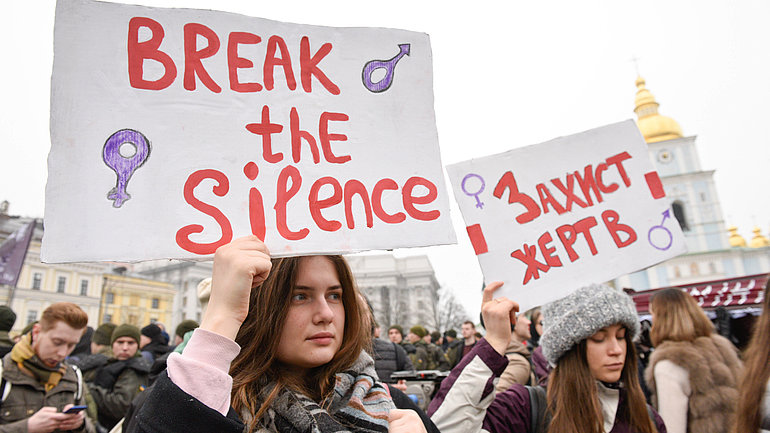Domestic Violence in Ukraine: What Role for Religious Leaders?

‘Don’t be silent, and don’t tolerate violence against yourself or your children.’ Those were the words of Metropolitan Epiphany, the head of the Orthodox Church of Ukraine, writing in November 2020 on the website Stop Violence. This would be a simple enough appeal coming from a police officer or a social worker, but it was quite revolutionary for a Ukrainian religious official.
According to followers of different religions, including various Christian denominations, the problem of violence in Ukraine’s religious families is a taboo. Although religious leaders have called for an end to domestic violence, they have allowed psychological harassment, the physical ‘upbringing’ of wives and children, and financial coercive control to continue. Moreover, Ukrainians rarely talk about violence against men, because it is seen as a source of shame.
In this context, the ongoing debate since 2017 over Ukraine’s ratification of the Council of Europe Convention on preventing and combating violence against women and domestic violence, better known as the Istanbul Convention, has threatened to change the public image of religious communities. On social networks, many users have noted the negative positions adopted by religious organisations towards the convention. At the same time, these organisations have not sought to explain how people should protect themselves against domestic violence or how to treat the concept of gender.
These heated debates have led to the emergence of two fronts: a secular-liberal group, whose members were labelled by their opponents as ‘propagandists of gender ideology’, and a traditional-conservative religious group. The latter rejected any concept to do with questions of gender and the prevention of domestic violence, while the former simply called for a fight against domestic violence. But how to organise that fight is the crucial unanswered question.
Mobilising the fight against domestic violence
The year 2020 brought to Ukraine not only the Covid-19 pandemic but also an epidemic of domestic violence. In the first eleven months of the year, the country registered more than 2,700 cases of domestic violence, compared with 1,500 in all of 2019.
Since spring 2020, Maksym Vasin and Oleksandr Zayets of the Ukrainian NGO the Institute for Religious Freedom have received support from CanadaFundUA, a Canadian foundation for local initiatives, to work with religious communities against the growth in domestic violence. The issue has become particularly critical as social services in Ukraine’s regions have begun to lay off staff due to budget cuts. Sometimes, churches and other religious buildings are the only shelters available for victims of domestic violence.
The Institute for Religious Freedom set out, on the one hand, to combine the efforts of people of different faiths to combat domestic violence and, on the other, to discuss the public rhetoric of religious leaders about the Istanbul Convention. The first meeting under the initiative brought together high-level religious representatives, including members of the All-Ukrainian Council of Churches and Religious Organisations (AUCCRO), to confirm their commitment to an agreement in principle and to a vision for the project.
At the project’s second meeting, delegates from religious organisations met to develop a communication strategy on fighting domestic violence together. Participants decided that religious communities should not only focus on their followers but engage with everyone. However, the main emphasis would be on outreach to religious ministers and leaders, who need to understand how to talk about violence—for example, if a priest learns about domestic violence at a confession or if parishioners want to create a support group or a social initiative.
A challenge for the working group was to compile instructions for ministers and practical guidelines. It became apparent that although isolated shelters and help centres exist, they are not well known and most refuges are closed for security reasons. Efforts to heal a religious community do not always meet with the approval of its leader, and many ordinary ministers have no idea how to support victims of violence.
Good intentions—but what next?
The AUCCRO’s work on the Istanbul Convention continued in the form of proposals to the authorities: a working group of lawyers and AUCCRO representatives to improve Ukraine’s laws on domestic violence; meetings of human rights and religious representatives to discuss ways of preventing different types of violence; and an updated legal framework to be monitored in all regions of Ukraine. The problem with these proposals is that they were largely declarative and have not moved beyond far-reaching plans.
However, the AUCCRO meeting on combating domestic violence did mark a certain shift. The readiness of religious leaders to talk publicly to human rights activists was an important step, but there was a lack of practical progress after that. By that time, the results of inter-religious cooperation had become apparent in the form of the website Stop Violence and a Facebook page that sought to unite the faithful in a joint commitment to fight domestic violence.
There is still a lot of work to be done, both with ministers and in Ukraine’s regions, to find shelters and raise awareness of ways to help victims of domestic violence. Perhaps there will be open dialogues between religious leaders and human rights activists on questions of gender and the Istanbul Convention. At the very least, the first step has been taken: the problem has been publicly discussed. Now, all those involved can continue to work towards solving it.
Tetiana Kalenychenko holds a PhD in sociology of religion and is a lecturer at the National Pedagogical M. P. Drahomanov University of Kyiv.